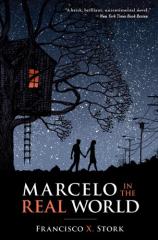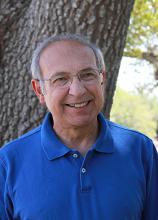Interview: March 2009
Francisco X. Stork is the author of three young adult titles: THE WAY OF THE JAGUAR, BEHIND THE EYES and the newly released MARCELO IN THE REAL WORLD. In this interview with Teenreads.com's Alexis Burling, Stork explains what inspired his main character's unique attributes and discusses the research he conducted in order to accurately paint a portrait of a young man suffering from a developmental disorder. He also elaborates on the concept of "large talk," sheds light on the sound advice given to Marcelo about "hearing the right note" and shares details about his next project due in stores next spring.
Francisco X. Stork: I wanted to write about a very special, one could almost say holy, young man who was diagnosed with Asperger syndrome (AS) because it is clear to me that a holy person in our modern world has a good chance of being diagnosed with something. If you look at the lives of persons we call “holy” (in any religion), you will find that they have qualities such as single-mindedness, intensity, introspection, purity of vision, qualities that our society sometimes calls abnormal. So I came to the special interest of religion in Marcelo, the “front around way.” I started with it and then arrived at the diagnosis of AS. My inspiration I think was the work I did when I was in college at L’Arche, a faith-based community where the so-called disabled and the normal live together with as few barriers as possible. I wanted to create someone who, like the disabled at L’Arche, had that vulnerability and sensitivity to suffering that the world both needs and rejects.
FXS: I’m glad you said that because I thought I was the only one who ever felt uncomfortable in those types of situations. Part of what Marcelo does is to show us how what is strange is now deemed normal and what is normal in a broad human sense is now deemed strange. Why is it strange to take out a rosary and pray in silence in a crowded train but not strange to divulge your intimate secrets into a cell phone in the same train?
FXS: Small talk --- the opposite of “large talk” --- is necessary and good up to a point, but we need to have a few people we can “large talk” with. ‘Why are we here on this earth?” When was the last time you and someone talked Large Talk like that?
FXS: Marcelo simply lucks out. And so does Jasmine. Jasmine is like him, but she completes him (to borrow a nice current phrase from the movies and from love songs) in areas where he needs completing. She teaches him how to function in the world without losing sight of who he is. He shows her how to “remember” and how not to lose sight of what is important in life. I wanted to show how each affected the other gradually. I wanted to show friendship blossom into love slowly. It is a true friendship, at first based on need, and then on affinity of interests, and later the friendship becomes something I call love.
FXS: I’ve been a lawyer for 27 years and I’ve met many young, very privileged young men who are like him. Actually, I’m sorry to say, there is a little or a lot of Wendell in most of us, in some way or another. Wendell, unfortunately, was easier to access than Marcelo. Evil is more on the surface than goodness --- such is the nature of mankind. But goodness is ultimately all that we have to get past Wendell in order to arrive at Marcelo.
FXS: It takes a lot of effort and courage and grace to love the truth.
FXS: I read about someone dying from a kick to the stomach by a horse. I think that was the inspiration for that story. I’m not sure exactly where the idea of a purebred racehorse coming to Vermont came from. It may be symbolic of someone from the warm climates of the Gulf of Mexico and Texas ending up laboring in the harsh New England winters, but I wouldn’t know about that for a fact!
FXS: I don’t play a musical instrument. We have an old piano at home that someone was going to throw away and we took it in. I tinker with it and it makes me feel good to do so even if the tunes I play are purely made up and unrecognizable and I am barely able to play with both hands. I listen to classical music --- all classical music of any kind, and by any instrument or orchestra or chorus. When I am sad, listening to very sad music somehow helps me. Bach and Beethoven are my favorite classical composers. Glenn Gould is my favorite classical pianist. Keith Jarrett, the jazz pianist mentioned in the novel, is my favorite composer/artist. Eva Cassidy is my favorite singer.
FXS: My son and daughter both attended Dartmouth College, right on the border with Vermont, and we used to travel from Boston to see them as much as we could, so I’m sure this influenced the choice of site for Jasmine’s home. I’ve spent time on farms in Texas, growing up. My adoptive father, Charles Stork, always picked places in Texas near farms and I got to know the neighbors. The animal husbandry in the novel probably comes from there.
FXS: At the law firm, Marcelo encounters legal issues that affect real people and he can see the suffering that comes with particular interpretations of the law. I think that showing how legal decisions are also moral decisions that can cause suffering, while at the same time showing the petty, all-too-human side of working in a law firm, is how I tried to make it authentic for kids (and for adults) too.
FXS: I have read tons about holy people. It has always been my own “special interest,” if you will. I did a lot of research about AS, and I especially read all the autobiographies written by people on the Autistic spectrum that I could get my hands on. I accessed my memories from L’Arche. I interviewed kids who had AS when I visited schools. I also have bipolar disorder and have had it or a form of depression since I was 14 years old. This mental illness gave me a small inkling as to how someone like Marcelo might view the world.
FXS: I wanted Arturo, Marcelo’s father, to be as real as Marcelo. I wanted his decisions with respect to Marcelo to be ambiguous in the sense that we didn’t know whether his decisions were good or not --- in the best interests of Marcelo or motivated by some other motive, like say, shame in his son’s condition. So I guess first and foremost, I wanted Arturo to be a normal, loving father who is human and is capable of making mistakes and sometimes acts for the wrong reasons. Even now, I’m not sure how I feel about Arturo. I mean, I’m glad he made Marcelo spend the summer at the law firm, but I’m not totally sure about his motives for doing so. As the summer develops, Marcelo understands the real world better in part by seeing his father’s humanity.
FXS: Yes. But like all of us who have been in this painful place and made it through, I either managed to get out of the wrong place or, with help, I was able to transform the wrong place into the right place.
FXS: What it means to me personally is that I have to trust I am able to hear the “right note” if I care to listen. And then I have to trust that the “right note” is right enough for me to follow. The sense of “the right note” was placed in us for a reason, and we should make it work for us. But we are not alone. Others can help us, traditions, wise or holy persons who have traveled this path before us, all can guide us. But in the end, the ultimate test of whether the note was right is the fruit of your action. Did you increase love and lessen suffering? If you did, your note was the right note.
FXS: My characters are all Mexican-Americans. That’s the “social” piece of my writing. I want everyone to see and appreciate the richness of my culture. A richness hidden sometimes by the stories about gangs and people coming over to take away jobs, by the negative images they see and read about. I want my children to be proud of being Americans and of their heritage.
FXS: I found my home in Arthur A. Levine Books/Scholastic. For some reason, they like to buy exactly the kind of books I like to write. I don’t know whether they are young adult books or adult books. Some of the publishers abroad who bought the rights to MARCELLO IN THE REAL WORLD plan to publish the book as both a young adult and an adult book. I don’t really care that much about that. I write books about young adults that can be read by young adults and by adults, but that doesn’t mean the content or style needs to be unsophisticated. The key question is this: Am I pulling any punches, am I avoiding certain subjects, or am I sacrificing talents by not seeking adult markets? For me the answer is a definite no. I’m happy.
FXS: My day job seriously interferes with my stories. Sometimes there’s not enough brainpower for both, and I must give precedence to what pays the bills. I can’t even say that my day job and my vocation, as I like to call it, complement each other. Let’s say that my “day job” is most of the time kind enough to let me do what fills my heart with joy.
FXS: The next book with Arthur A. Levine Books/Scholastic comes out next spring. It’s about a growing friendship between two very different boys and there’s a beautiful girl in there too, and it all takes place in New Mexico. I’d tell you more but then.




